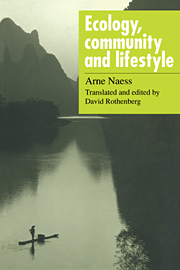Book contents
- Frontmatter
- Contents
- Translator's preface
- Introduction: Ecosophy T – from intuition to system
- 1 The environmental crisis and the deep ecological movement
- 2 From ecology to ecosophy
- 3 Fact and value; basic norms
- 4 Ecosophy, technology, and lifestyle
- 5 Economics within ecosophy
- 6 Ecopolitics within ecosophy
- 7 Ecosophy T: unity and diversity of life
- Bibliography
- Index
5 - Economics within ecosophy
Published online by Cambridge University Press: 13 October 2009
- Frontmatter
- Contents
- Translator's preface
- Introduction: Ecosophy T – from intuition to system
- 1 The environmental crisis and the deep ecological movement
- 2 From ecology to ecosophy
- 3 Fact and value; basic norms
- 4 Ecosophy, technology, and lifestyle
- 5 Economics within ecosophy
- 6 Ecopolitics within ecosophy
- 7 Ecosophy T: unity and diversity of life
- Bibliography
- Index
Summary
The contact with total views
It has been said in the first chapter that what makes the ecological situation especially serious is that there is a deeply grounded ideology of consumption and production which is unecological. This kind of diagnosis makes it essential to analyse economic conditions and to consider a science with great influence, namely economics.
There is another motivation, namely that economics has traditionally a broad contact with total views with normative content.
Economy comes from the Greek word oikonomos: one that takes care of the household, a normative undertaking. So to be a good and wise economist is in this sense nothing terribly exciting, or special. Oikonomos is a word that may be put in contrast to cosmonomos: the nature and world administrator that very few beings can live up to. But already Xenophon, Plato, and Aristotle treated the household problems for the community as a whole, for polis. Xenophon was the first in a long series of thinkers who looked at economics from a rather narrow point of view. They became the ideological advocates primarily of the people who had property, the landowners.
Economics is, in the European tradition, often defined as the science of how to satisfy human needs. But since it clearly does not talk about every kind of need it becomes necessary to define ‘economic’ needs. What are these?
- Type
- Chapter
- Information
- Ecology, Community and LifestyleOutline of an Ecosophy, pp. 104 - 129Publisher: Cambridge University PressPrint publication year: 1989



